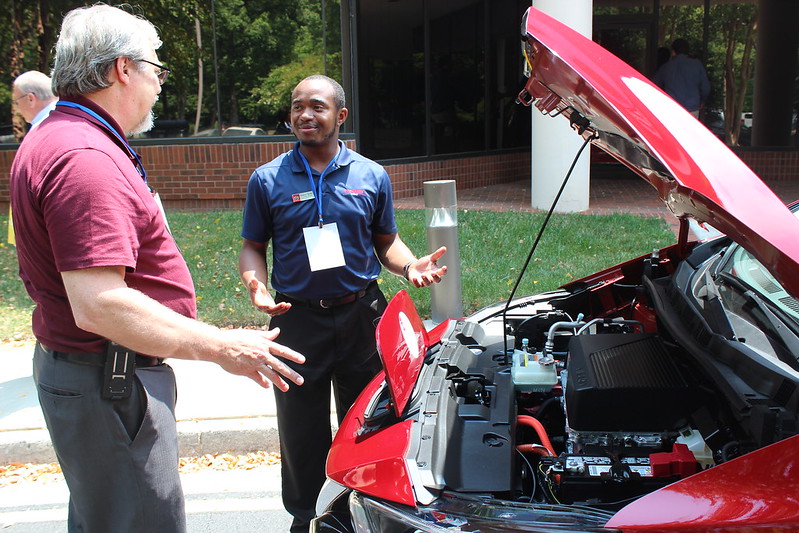EV Charging Options
Electric Vehicles Supply Equipment (EVSE) is used to charge a plug-in electric vehicle (EV) with electricity. There are three main types of EVSE, Level 1, Level 2 and DC fast charging (DCFC). The chart below displays the differences.
Level 1 Chargers: L1 chargers use an alternating current and are mainly used for residential charging due to their long charge times. Nearly every EV comes with a traditional three-pronged plug for an outlet with a connector plug for insertion into the vehicle.
Level 2 Chargers: L2 chargers also use an alternating current, but at a higher amperage and voltage, resulting in a decent improvement in charge time. L2 chargers can be used for residential and workplace charging. L2 chargers cannot be connected to a traditional wall outlet and must have hard-wired charging equipment.
DC-fast charging (DCFC): DC faster chargers use a direct current allowing them to deliver a significant increase of amperage and voltage. DC chargers are able to charge 60 – 300 miles of range per 20 minutes, making it timely charging along heavy traffic corridors and heavy-duty fleet use.

| Charger | Current Type | Voltage (V) | Charging Time | Power | Primary Use | Connector |
| Level 1 | Alternating Current (AC) | 120V | 2-5 miles of range per hour of charging | 1.3-1.9 kiloWatts | Residential | |
| Level 2 | AC | 240V | 10-80 miles of range per hour of charging | 3-19.2 kiloWatts | Residential/ Commercial |
|
| DC Fast | Direct Current (DC) | 480V | 60-1000 miles of range per 20 minutes of charging | 50-350 kiloWatts | Commercial | |
| Wireless | AC | 240V | 10-20 miles of range per hour of charging | 3.3-7.2 kiloWatts | Residential/Commercial | |
Find a charger near you, or plan a trip using the Alternative Fueling Station Locator!
Check out PlugShare – An interactive EV station locator

PlugShare is an EV charging station locator for everyday users. It allows users to see what stations are currently being used, under repair, and what they look like. PlugShare’s interactive features and frequent updates make it exceptionally useful for EV drivers nationwide.
EV Charger Incentives
There are a number of incentives to support the installation of EV charging stations in Virginia. Municipalities, property managers and business owners can explore them to ensure they are ready to support this growing market segment. Here is a sample list to help you get started.
- EVgo and Virginia DEQ have invested millions to expand DC Fast Charging in highway corridors in Virginia. Together the effort is deploying 80 to 100 new charger sites. Contact EVgo through their website to suggest a site or email Heidi Krantz heidi.krantz@evgo.com.
- Electrify America is deploying charger depots and DC Fast Chargers and is headquartered in Reston, Virginia. The company is expanding its charger network in Virginia and throughout the country. It also recently added Virginia to its kilowatt-hour pricing program, simplifying billing for customers.
- Tesla has a program for “Destination Charging Partners” in the hospitality, retail, multi-family, and workplace categories. This program often delivers Tesla and standard chargers that work on all vehicles.
- Blink Charging plans to install 200 networked 19.2 kWh L2 Chargers in Virginia, DC, Maryland, and West Virginia as a part a three-year ecosystem program. Each charger is capable of providing 19.2 kwh or about 65 miles of charge per hour. Learn more at www.blinkcharging.com and contact Andrew Hillman Ashillman@BlinkCharging.com for more information.
- Greenspot is installing 24 e-Mobility hubs consisting of 6 L2 chargers in Virginia, DC, Maryland and West Virginia as a part a three-year ecosystem program. Greenspot will install an initial set of 24 e-Mobility hubs which includes 72 dual chargers and a total of 144 EV ports. Visit www.joingreenspot.com or email joseph@joingreenspot.com.
- For all laws and incentives in Virginia visit this page on the Virginia Clean Cities website.
- Procurement Contracts Exist. For Virginia municipalities and other government entities, check here. Virginia Clean Cities can also help determine if your EVSE procurement could be included in existing state or rideable contracts.
Virginia Clean Cities helps stakeholders to take advantage of these and other incentives. Interested parties are encouraged to fill out this form with interest about charging, and we will get back to you. We also work with individual EV drivers to help ensure they have the resources they need.
Virginia EV Dealerships
All dealerships listed in the map below are actively selling EVs. If you know of a dealership selling many EVs, but isn’t listed, please email us at info@vacleancities.org.
EV dealership highlights:
Recharged in Richmond, Virginia, sells only used EVs. Check them out!
The CMA Auto Group has charging stations and certified EV specialists on staff!
